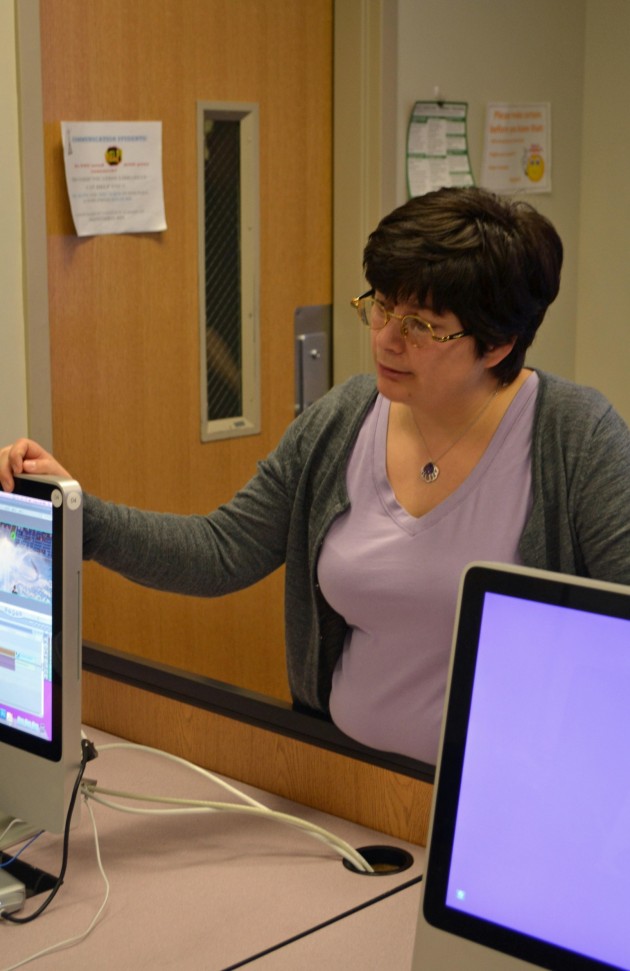
Who would have thought that the mountainous setting of Western Carolina University resembles that of Macedonia, a country in southeast Europe. For Katerina Spasovska, assistant professor of communication, that similarity is what led her to choose WCU as her home, both professionally and personally.
Growing up in socialist Macedonia before its bumpy transformation into a republic, Spasovska’s parents afforded her the opportunity to travel to countries like Croatia, Montenegro, Greece, Bulgaria and Hungary during the summers. She credits her early love of travel as a factor in her decision to major in journalism at the University of St. Cyril and Methodius in Skopje, Macedonia.
“I knew I wanted to major in journalism from fifth grade in primary school,” Spasovska said. “I had written some pieces for the school paper and had a friend whose father was a correspondent for the only news agency in the area. I always loved the stuff he was writing and naturally I became interested in reading and writing.”
After graduating with a bachelor’s degree in journalism in 1995, Spasovska travelled for the first time to the United States for an intense journalism clinic with the Center for International Journalists. Along with nine other participants, Spasovska worked from a Connecticut farm in the middle of nowhere, remembering the large elk population and the huge mosquitos.
The group spent two days in New York and travelled to Washington D.C. for two weeks, each of the participants working on stories that were to be published in Macedonia. Spasovska’s article centered around the World Bank and its decisions to extend credit to countries, as Macedonia was moving towards a market economy.
Two years later, Spasovska returned to the U.S. as a Ron Brown Fellow at the University of Missouri, Columbia, to study for her Master’s degree. Working with U.S. organizations and U.S.-based journalists, Spasovska acquired good references, helping her to obtain the fellowship.
Spasovska graduated in 2000 with a master’s degree in journalism and afterward returned to Macedonia to work for USAID in media development and as a web producer for a trilingual website, Pressonline.
During her time as a journalist in Macedonia, Spasovska also worked as both an editor and writer for a Macedonian news magazine, winning awards for a series of stories about human trafficking.
She also wrote reports on social issues like homosexuality in Macedonia and children with physical and mental challenges. Then, as coordinator for SCOOP, a network of Southeastern European and Danish investigative journalists, Spasovska helped develop a regional story on fake diplomas in Macedonia, Bulgaria, Kosovo and Albania.
Returning to the U.S. in 2004 to cover the presidential election, Spasovska met a professor at the University of Oklahoma who had similar research interests: media development in Southeast Europe and minority media. With a U.S. contact, Spasovska enrolled as a doctorate student at the University of Tennessee at Knoxville, with her research colleague acting as her mentor.
After graduating in 2011 with her doctorate in communication, with a concentration in journalism and electronic media, Spasovska applied for a position at Western Carolina University.
On her decision to teach in the States, Spasovska said, “After my Master’s I tried to teach in Macedonia, but the other professors felt threatened by my American diploma and the changes to education that I wanted to make.”
As an assistant professor at WCU, Spasovska teaches classes on news writing, reporting, writing for broadcast and practicum. Last semester she taught a course on international media and reporting, giving students a chance to look at journalists around the world, such as how they work and where they work.
For students in journalism, Spasovska gives the following advice, “Be diversified and learn as much as possible. While writing is important, knowing things like HTML, content management systems (CMS), and researching stories are important to getting a job over someone else.
Employers want well-rounded, independent journalists who know how to write a story but are also able to tell the story in different ways and for different media platforms,” she added. “That means journalists have to be the ‘Jack of all Trades’ but with that it opens more possibilities.”
In all, Spasovska has over 14 years of journalistic experience in print, radio, television and digital journalism. She has worked with the U.S. Information Service and received international recognition for her investigative reporting. She is the faculty advisor for the Western Carolina Journalist, the news website of the Department of Communicaiton, and speaks over five languages.






